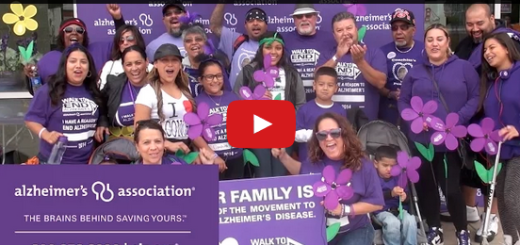Azheimer’s a “living death?” A response to Pat Robertson
Today’s news created a buzz in our office about the Reverend Pat Robertson’s televised comments about divorcing a spouse with Alzheimer’s while the person with Alzheimer’s was still living and calling the disease “a kind of living death.” Not being a viewer of his program, I was at first perplexed as to why he felt the need to comment on this, but on reading the transcript, he was asked the question and to his credit, he suggested they ask an “ethicist besides me.”
In my 24 years of working with the Alzheimer’s Association, I just haven’t seen this issue. I’ve seen divorced spouses return to the relationship to provide care. I’ve had spouses tell me they almost divorced because they didn’t recognize the early signs and mistook them for trouble in the relationship. I’ve known divorce to be discussed in the context of preserving assets as long term care and MediCal loomed (there are better options). I’ve know many people to developed close relationships with friends who helped the well spouse get through the journey and who married after the person with dementia died.
However, the story raises issues as to the challenges of maintaining spousal relations as Alzheimer’s inevitably progresses, why and how being a spouse caregiver has special challenges and why or if actions that would be unacceptable otherwise are viewed differently when one partner is cognitively impaired and will only continue to decline.
I don’t have to tell readers of this blog that Alzheimer’s is hard on families and particularly on caregivers and in my experience it’s generally harder for spouses than for adult children. They have a different kind of history together. They’ve known one another only as adults and by the time Alzheimer’s symptoms appear, they’ve often been together a long time. Consider also the age of the afflicted population. While we know too well that many younger onset folks are challenged with Alzheimer’s, it remains an age-related condition and the spouse caregiver may have physical challenges of his/ her own. This is part of why we offer support groups – to give people the opportunity to talk through these very complicated and personal issues – and to connect with others who have been there.
I was talking to an 89 year old female relative recently whose husband is still reasonably early in his Alzheimer’s. They need to sell some property that would previously have involved them both in the decision. I counseled her to do this without involving him as I suspected he wouldn’t like the idea even though it needs to be done. She couldn’t do it. She felt she would be deceiving him and “that’s not the kind of person I am and I wouldn’t want someone to do that to me,” she said tearfully. I suspect she may think differently as the condition progresses, but it makes the point that Alzheimer’s taxes the existing relationship, but it doesn’t change everything.
I also don’t like talking about Alzheimer’s as “a living death,” though I understand that some people may see it that way. It’s important to remember that the dementia that results from Alzheimer’s runs many years, averaging eight years from onset of symptoms to death and a person in the first years of the disease is at a very different functional level than in the last months.
Pat Summit and Glen Campbell recently shared their diagnosis with the world and declared that they want to go on working at their professions. Surely they don’t think of themselves as living a death. We wish them so well and will hold our breaths as they go forward.


















Bill thank you so much for your reasoned and helpful insights in this piece. Rev. Roberstson’s history of inaccurate and callous public pronouncements have reduced him to irrelevance for the most part. You have used this latest occasion to educate and encourage. Thank you!
Thank you for your insight! I was so troubled at Robertson’s comments. I watched my father for 26 yrs. demonstrate his understanding of “for better or worse” as he loved and cared for my mother during her long illness. Please check out my song/video, “Just Keep Holding On,” co-written with another secondary victim of this disease. I guess the question could be … care or cop out?
http://www.youtube.com/watch?v=6sTqTinC3ac